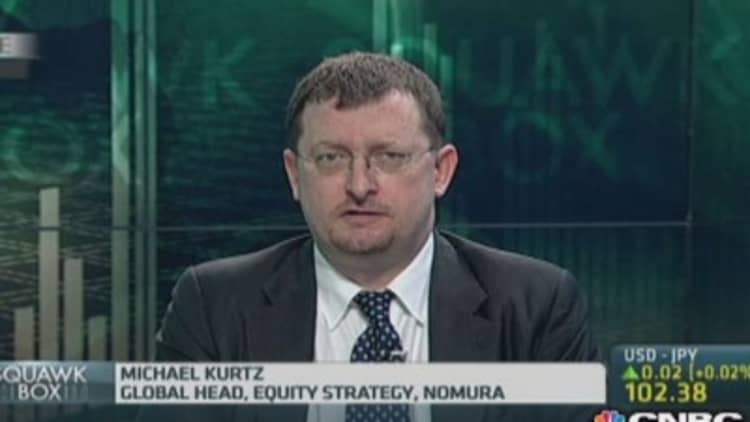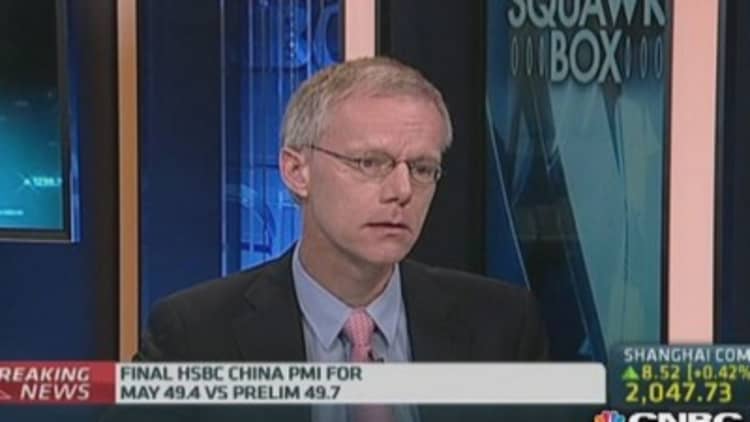Asian stocks finished mixed on Tuesday following key Chinese economic data and monetary policy decisions in Australia and India.
In China, HSBC's final purchasing managers' index (PMI) for May came in at 49.4, down from a preliminary reading of 49.7, but higher then April's 48.1 figure. Meanwhile, activity in the country's services sector rose to a six-month high in May.
"The final [manufacturing] PMI reading for May confirmed that the economy is stabilizing, but it is too early to say that it has bottomed out, particularly in light of a weaker property sector. The lack of a sustainable growth momentum warrants stronger policy support. We expect both monetary and fiscal policy to be loosened gradually over the coming months," said Hongbin Qu, chief economist, China & co-head of Asian economic research at HSBC.
Read MoreIs China still growing too fast?
On Wall Street, the Dow and finished at fresh highs for a third straight session on upbeat manufacturing data. The Institute for Supply Management corrected its May manufacturing data for a second time to 55.4. The index was first corrected to 56 after being initially reported as 53.2.
Asia on central bank watch
As expected, the Reserve Bank of Australia left its benchmark cash rate unchanged at a record low of 2.5 percent, repeating its outlook for a period of stability in interest rates. Meanwhile, the Reserve Bank of India kept its key interest rate steady at 8 percent, saying that more policy tightening would not be warranted if the economy continues on a disinflationary path.

Nikkei 0.6% higher
Japanese shares rose to a fresh two-month peak for the second straight session with a combination of factors underpinning gains. According to the Nikkei newspaper, the government pension investment fund (GPIF), the world's biggest, may be raising its domestic stock weighing to 20 percent from 12 percent currently.
Comments from Bank of Japan chief Haruhiko Kurdoa and finance minister Taro Aso also supported sentiment. Kuroda said he won't hesitate to adjust policy if risks threaten the bank's 2 percent inflation target while Aso said he is open to lowering the corporate tax rate next fiscal year if the government can find ways to make up for the lost revenue.
Read MoreAbe's reform plan draft leaves unanswered questions
Consumer electronic names were among the top gainers, with Hitachi and Casio Computer both more than 3 percent higher. Index heavyweight Softbank meanwhile, rose over 2 percent.
China shares mixed
China's benchmark Shanghai Composite erased gains in the final hour of trade to close just below the flatline. Markets were closed on Monday for the Dragon Boat Festival.
Financials rallied following Friday's news that Beijing will cut the reserve requirement ratio (RRR) for banks to provide support to the rural economy and small and medium-sized enterprises. Bank of China jumped nearly 2 percent while Agricultural Bank of China added 0.8 percent.

Dairy-maker Inner Mongolia Yili Industrial Group tumbled nearly 8 percent on reports that four of its subsidiaries failed to make the list for qualified infant formula procedures.
Meanwhile, Hong Kong's Hang Seng Index rose 0.7 percent to a new six-month high.
ASX dips 0.7%
Australian shares ended at near two-week lows as investors digested mixed economic reports. April retail sales rose 0.2 percent on month, in line with forecasts while the first-quarter current account deficit narrowed to A$5.7 billion, compared to forecasts for A$7 billion.
Read MoreIs trouble in store for the Australian economy?
The Australian dollar rose to a three-day high of $0.9272 after the central bank said that the currency remains high by historical standards given falling commodity prices.
Financials were the top underperformers, with Macquarie down 1.6 percent and Commonwealth Bank of Australia 0.8 percent lower.
Kospi up 0.3%
South Korean shares managed to end higher after briefly touching a one-week low of 1,990 points earlier in the session. Data showed that annual inflation rose to a 19-month high in May, which traders said supported expectations of an interest rate hike from the Bank of Korea later this year.
Samsung affiliates rallied on news that Samsung Everland will be seeking an initial public offering. Samsung Electronics jumped 1 percent while Samsung SDI climbed 4.3 percent.
Emerging markets gain
India's benchmark index added 0.6 percent to a one-week high while the declined to 59.2 per dollar, in sight of a new one-month low.
Thailand's benchmark SET Index finished nearly 1 percent higher, a level not seen since last October.

